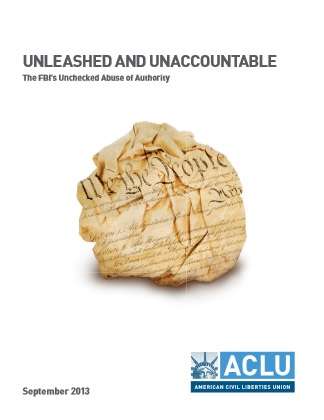FBI Plays the Role of Domestic Spy And Spy-Enabler, Says New Report

Sure, the National Security Agency has been caught spying beyond the borders of the United States and also here at home. But the NSA scoops up its domestic data courtesy of the the FBI and the enormous surveillance powers that law-enforcement agency has acquired in recent years. The Bureau isn't shy about spying on its own behalf, either. Never hesitant about flexing its muscles to target dissenters and whistleblowers, the FBI, reveals a new report from the American Civil Liberties Union, was empowered and set loose in the wake of the 9/11 attacks, and is more dangerous than ever.
You know those phone records we've been fretting about the NSA accumulating? Well, in Unleashed and Unaccountable: The FBI's Unchecked Abuse of Authority, the authors write:
Every 90 days for the past seven years the FBI has obtained secret Foreign Intelligence Surveillance Court (FISA Court) orders compelling telecommunications companies to provide the government with the toll billing records of every American's telephone calls, domestic and international, on an ongoing daily basis.
That's because intelligence agencies in the United States are supposed to focus their efforts beyond the country's borders. But if they team up with a law-enforcement agency authorized to operate within the United States…
In fact, the strictures to which the FBI itself was subject, because of a history of "targeting immigrants, racial and religious minorities, and political dissidents for surveillance, infiltration, investigation, and 'disruption strategies'" have largely been lifted as a consequence of 9/11. the FBI has also gained access to new legal authority and the technological tools to more intrusively scrutinize people's communications and activities, for good or ill. The FBI may now be tapping so many sources of information that's it's effectively trying to drink from a firehose. The ACLU report quotes former FBI Director William Webster complaining of a "data explosion" that brings in too much information to analyze.
The loosened restrictions on the FBI are sometimes explicit, such as the authority granted by the Patriot Act, but also a matter of creatively interpreting existing laws and court rulings.
Attorney General Michael Mukasey rewrote the FBI's rule book in 2008, giving FBI agents unfettered authority to investigate anyone they choose without any factual basis for suspecting wrongdoing. The 2008 Attorney General's Guidelines created a new kind of intrusive investigation called an "assessment," which requires no "factual predicate" and can include searches through government or commercial databases, overt or covert FBI interviews, and tasking informants to gather information about anyone or to infiltrate lawful organizations. In a two-year period from 2009 to 2011, the FBI opened over 82,000 "assessments" of individuals or organizations, less than 3,500 of which discovered information justifying further investigation.
The FBI has a habit of using "exigent letters" which are legal shortcuts supposed to be used only in emergency circumstances, to gather information. When this becomes problematic, it sometimes issues secret National Security Letters to cover the earlier use of the exigent letters. The FBI has used hundreds of thousands of NSLs, but the exact number isn't clear since, at least at one point, the Bureau lost track.
Aside from its own investigative efforts, the FBI has also taken to collecting data from state and local law-enforcement agencies, as well as private sources. This is all part of the firehose mentioned above.
Who is on the receiving end of all of that data collection? Well, so much data is hoovered up that you could say all of us. But in recent years, the FBI has specifically targeted Muslims and Arabs, advising agents to be on the lookout for suspicious activities such as "frequent attendance at a mosque." FBI training materials also express concern about "Anarchist Extremists" and continue a decades-long obsession with "Black Separatists."
This might be all right if the FBI were specifically watching for violent and criminal activity by the aforementioned groups, but many of the warning signs for which agents are supposed to watch are as First Amendment-protected as attending religious services—including submitting FOIA requests.
And when the FBI does bust criminal activities with infiltrators and informants, there's often a question about just who is guilty of what.
In many cases the government agent provides all the instrumentalities of the crime, chooses the target, designs the plot, and provides the gullible subjects financial support or other incentives to carry out the plot. The subjects are often destitute and at times become financially dependent on the informants.
Exempted from the Whistleblower Protection Act, the FBI freely retaliates against employees who attempt to call out wrongdoing. As a result, it's rare for FBI employees to speak out. That culture lends itself to a willingness to target whistleblowers in other agencies—and journalists. Apart from recent revelations about spying on the press, "In 2010 the Inspector General reported the FBI used an illegal 'exigent letter' to obtain the telephone records of 7 New York Times and Washington Post reporters."
Born in the fear- and intolerance-fueled red-scare Palmer Raids that even the FBI itself labels "certainly not a bright spot for the young Bureau," the FBI seems to have done litttle over the decades but add power and high-tech toys to its ever-authoritarian institutional persona. For which the NSA thanks it.
Read the full ACLU report here.
